高中英语 Unit 5《Nelson Mandela-a modern hero》教案27 新人教版必修1
- 格式:pdf
- 大小:325.79 KB
- 文档页数:34
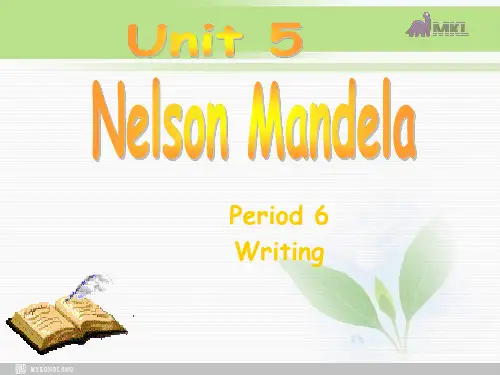
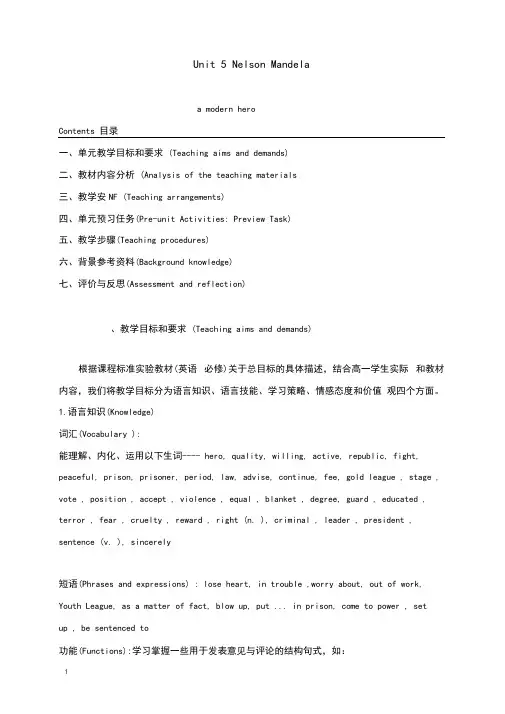
Unit 5 Nelson Mandelaa modern heroContents 目录一、单元教学目标和要求(Teaching aims and demands)二、教材内容分析 (Analysis of the teaching materials三、教学安NF (Teaching arrangements)四、单元预习任务(Pre-unit Activities: Preview Task)五、教学步骤(Teaching procedures)六、背景参考资料(Background knowledge)七、评价与反思(Assessment and reflection)、教学目标和要求(Teaching aims and demands)根据课程标准实验教材(英语必修)关于总目标的具体描述,结合高一学生实际和教材内容,我们将教学目标分为语言知识、语言技能、学习策略、情感态度和价值观四个方面。
1.语言知识(Knowledge)词汇(Vocabulary ):能理解、内化、运用以下生词---- hero, quality, willing, active, republic, fight, peaceful, prison, prisoner, period, law, advise, continue, fee, gold league , stage , vote , position , accept , violence , equal , blanket , degree, guard , educated , terror , fear , cruelty , reward , right (n. ), criminal , leader , president , sentence (v. ), sincerely短语(Phrases and expressions) : lose heart, in trouble ,worry about, out of work, Youth League, as a matter of fact, blow up, put ... in prison, come to power , setup , be sentenced to功能(Functions):学习掌握一些用于发表意见与评论的结构句式,如:1. 发表意见(Giving opinions )Why do you think so? What do you think of …? What's you opinion?agree / don't agree. I think / don't think .... I prefer .... In myopinion ....I'm afraid ....2.评论(Making comments)Good idea! That's an excellent idea .语法(Grammar):定语从句(II )(由where, when, why, 介词+ which, 介词+ whom引导的定语从句)The school where I studied only two years was three kilometres awayThis was a time when you had got to have a passbook to live in JohannesburgThe reason why I got a job was because of my hard work .•••we were put in a position in which we had either to accept we were less important, or fight the Government .The person to whomyou should be grateful for a peaceful South Africa is Nelson Mandela.扩展词汇:negative(消极的),heroine(女主角,女主人公),unwilling(不情愿的),nation(国家,民族),sacrifice(牺牲),realize (认识到),give up (放弃),riches (财富),Bible (圣经),revolution (革命),career (职业),equality (平等),fairness(公平),conflict (冲突),biography (自传),beliefs (信仰),Christianity (基督教),religion (宗教),priests (牧师),version (翻译),readable (易读的),adventure (冒险),scholar (学者),sympathy (同情),,campaign (从事活动),communist (共产主义者),injustice (不公平),oppose (反对),pilot(飞行员) , boycott (联合抵制)2.语言技能(Skills)听:在本单元的课文及练习册听力教学中,能听懂人物和事件以及它们的关系,能抓住所听语段中的关键词,正确理解话语间的逻辑关系。
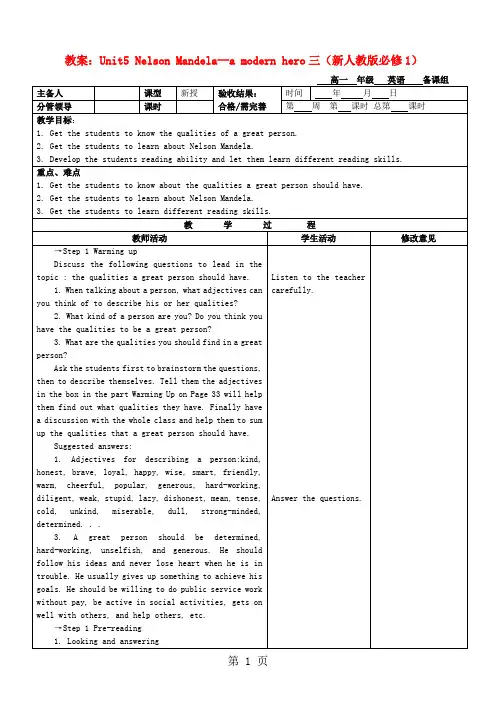
教案:Unit5 Nelson Mandela--a modern hero三(新人教版必修1)Look at the six people in the part Pre-reading and answer the following questions.1)Can you recognize them? Who are they?2)Do you think they are important people? Why or why not?3)Do you think all of them are great people?One minute for students to think them over. Then check with the whole class.Suggested answers:2)Yes, they are, because they have done something really important to benefit a country or the world.3)No, I think not all of them are great people.2. Discussing and speakingStudents read the information of each of the six persons, discuss in pairs what qualities make a great person and find out whether he is a great person or not.When they are discussing, remind the students to use the following expressions for giving and asking for opinions:I think/I don’t think. . . ; in my opinion; I’m afraid. . . ; I agree/I don’t agr ee. . . ; I prefer. . . ; What’s your opinion? Why do you think so? What do you think of. . . ?Several minutes later, ask some pairs to act out their dialogues.A sample dialogue:A:What qualities do you think make a great man?B:In my opinion, a great man is one who has followed his or her ideas and sacrificed something so that they could be realized.A:What is the difference between a famous person and a great person?B:A famous person may be well-known but if he or she has not gone through struggles and difficulties for their noble cause, they can not be called a great person.A:Do you think William Tidal is a great person?B:Yes. I think so. He had a strong belief that all people should be able to read the Bible for themselves. So he translated and printed it into English although he was not allowed to do so. And later he died for his work.A:I agree. William Tyndale went through a lot of struggles and difficulties and even sacrificed his life to realize his dream. He is a great person that everybody who picks up the Bible must think of. Now,。
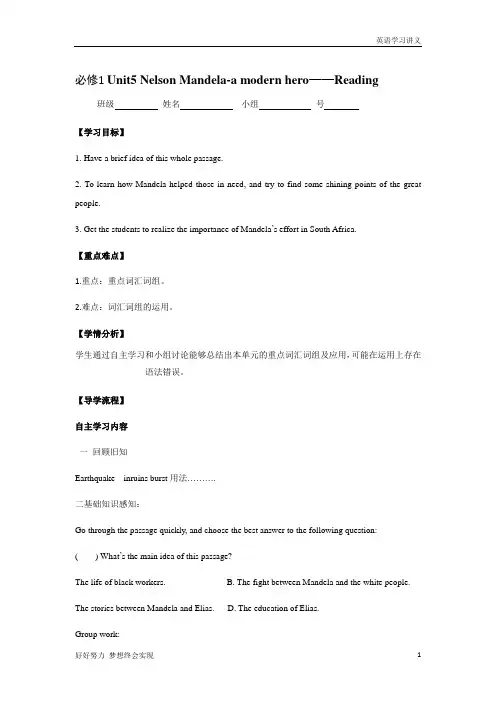
必修1Unit5 Nelson Mandela-a modern hero——Reading 班级姓名小组号【学习目标】1. Have a brief idea of this whole passage.2. To learn how Mandela helped those in need, and try to find some shining points of the great people.3. Get the students to realize the importance of Mandela’s effort in South Africa.【重点难点】1.重点:重点词汇词组。
2.难点:词汇词组的运用。
【学情分析】学生通过自主学习和小组讨论能够总结出本单元的重点词汇词组及应用,可能在运用上存在语法错误。
【导学流程】自主学习内容一回顾旧知Earthquake inruins burst用法……….二基础知识感知:Go through the passage quickly, and choose the best answer to the following question:( ) What’s the main idea of this passage?The life of black workers. B. The fight between Mandela and the white people. The stories between Mandela and Elias. D. The education of Elias.Group work:We can divide the text into two parts. How can we divide the parts? Give the general idea of each part.Part One: Paragraphs ___--___Mainidea:___________________________________________________________________________ Part Two: Paragraphs ___--___Mainidea:___________________________________________________________________________ Match each paragraph with its main idea.Para 1 The day when Mandela helped me was one of my happiest.Para 2 We answered violence with violence.Para 3 Black people have almost no rights at all.Para 4 I first met Nelson Mandela.Para 5 I needed his help because I had very little education.三、探究问题4. Read paragraphs 1&2, and answer the questions below:1)Who is Elias?2)What was Mandela’s job then? What did he do to help the black people?3)Why did Elias need help from Nelson Mandela?4)Why did Elias have very little education?5)Why would Elias become out of work?5. Read paragraphs 3,4&5,and answer the questions below:1)What problems did black people have?2)What did Elias do for Mandela?6. Read the whole passage again and decide if the following statements are true or false and give a reason.( ) Elias went to see Nelson Mandela when he was in trouble.( ) Elias left school because the school was too far from his home.( ) Nelson Mandela helped him keep his job.( ) Elias trusted Nelson Mandela and he joined the ANC Youth League.( ) Elias was willing to blow up government buildings.( ) Nelson Mandela thought violence was a good way to help black people.四、基础知识拓展与迁移:translate the following phrases1) fight against/for ____________________ 2) 在...方面很大方________________________3 )be grateful for ____________________4)devote oneself/one’s life to_________________5)out of work ___________________6) be hopeful about __________________________7) 触犯法律______________________8) 被关进监狱______________________________ 9) achieve one’s dream of___________________ 10)blow up__________________________ 请及时记录自主学习过程中的疑难:小组讨论问题预设:3. Make a timeline of Elias’ life.1940:_____________________________________________1946:_____________________________________________1948:_____________________________________________1952:____________________________________________ _1963:_____ ________________________________________提问展示问题预设:英语学习讲义3. Make a timeline of Elias’ life.1940:_____________________________________________1946:_____________________________________________1948:_____________________________________________1952:_____________________________________________1963:_____________________________________________边板讲解课堂训练问题预设:见课本35页1题整理内化:1、课堂小结2、本节课学习内容中的问题和疑难。
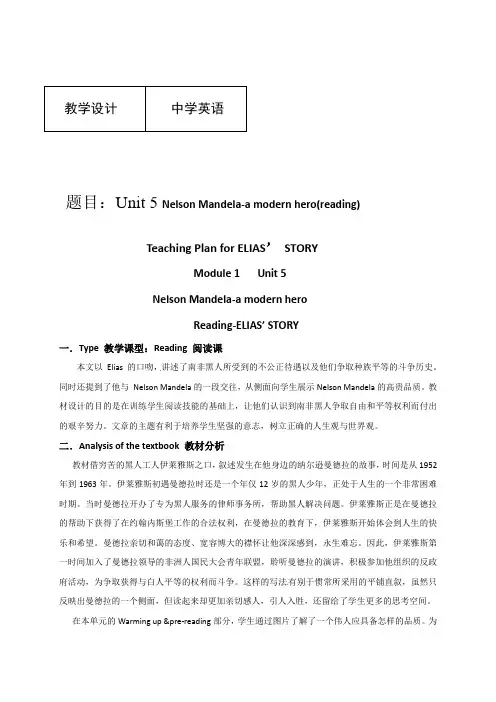
教学设计中学英语题目:Unit 5 Nelson Mandela-a modern hero(reading)Teaching Plan for ELIAS’STORYModule 1 Unit 5Nelson Mandela-a modern heroReading-ELIAS’ STORY一.Type 教学课型:Reading 阅读课本文以Elias 的口吻,讲述了南非黑人所受到的不公正待遇以及他们争取种族平等的斗争历史。
同时还提到了他与Nelson Mandela的一段交往,从侧面向学生展示Nelson Mandela的高贵品质。
教材设计的目的是在训练学生阅读技能的基础上,让他们认识到南非黑人争取自由和平等权利而付出的艰辛努力。
文章的主题有利于培养学生坚强的意志,树立正确的人生观与世界观。
二.Analysis of the textbook 教材分析教材借穷苦的黑人工人伊莱雅斯之口,叙述发生在他身边的纳尔逊曼德拉的故事,时间是从1952年到1963年。
伊莱雅斯初遇曼德拉时还是一个年仅12岁的黑人少年,正处于人生的一个非常困难时期。
当时曼德拉开办了专为黑人服务的侓师事务所,帮助黑人解决问题。
伊莱雅斯正是在曼德拉的帮助下获得了在约翰内斯堡工作的合法权利,在曼德拉的教育下,伊莱雅斯开始体会到人生的快乐和希望。
曼德拉亲切和蔼的态度、宽容博大的襟怀让他深深感到,永生难忘。
因此,伊莱雅斯第一时间加入了曼德拉领导的非洲人国民大会青年联盟,聆听曼德拉的演讲,积极参加他组织的反政府活动,为争取获得与白人平等的权利而斗争。
这样的写法有别于惯常所采用的平铺直叙,虽然只反映出曼德拉的一个侧面,但读起来却更加亲切感人,引人入胜,还留给了学生更多的思考空间。
在本单元的Warming up &pre-reading部分,学生通过图片了解了一个伟人应具备怎样的品质。
为熟悉本课的内容作了铺垫。
虽然学生对一些伟人已经有一点的背景知识,但是对Nelson Mandela 并非完全了解。
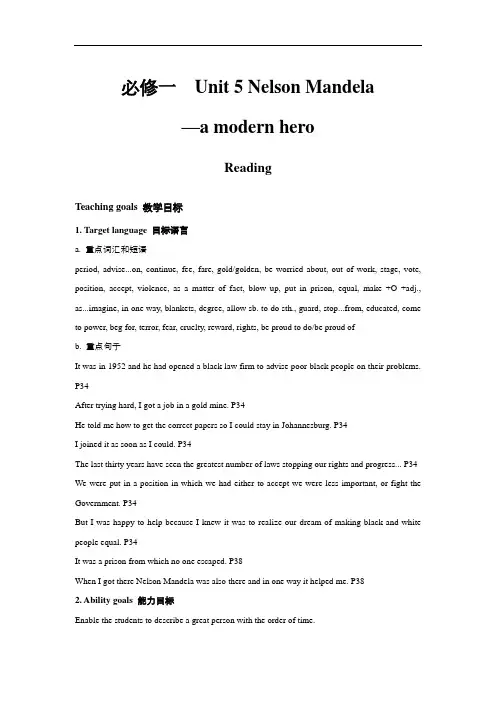
必修一Unit 5 Nelson Mandela—a modern heroReadingTeaching goals 教学目标1. Target language 目标语言a. 重点词汇和短语period, advise...on, continue, fee, fare, gold/golden, be worried about, out of work, stage, vote, position, accept, violence, as a matter of fact, blow up, put in prison, equal, make +O +adj., as...imagine, in one way, blankets, degree, allow sb. to do sth., guard, stop...from, educated, come to power, beg for, terror, fear, cruelty, reward, rights, be proud to do/be proud ofb. 重点句子It was in 1952 and he had opened a black law firm to advise poor black people on their problems. P34After trying hard, I got a job in a gold mine. P34He told me how to get the correct papers so I could stay in Johannesburg. P34I joined it as soon as I could. P34The last thirty years have seen the greatest number of laws stopping our rights and progress... P34 We were put in a position in which we had either to accept we were less important, or fight the Government. P34But I was happy to help because I knew it was to realize our dream of making black and white people equal. P34It was a prison from which no one escaped. P38When I got there Nelson Mandela was also there and in one way it helped me. P382. Ability goals 能力目标Enable the students to describe a great person with the order of time.3. Learning goals 学能目标Help the Ss how to describe a great person.Teaching important points 教学重点The general idea of the text.Teaching difficult points 教学难点The characteristic of the writing in this unit.Teaching methods 教学方法Skimming method.Task-based method.Explaining method.Teaching aids 教具准备A recorder, a projector and some slides.Teaching procedures and ways 教学过程和方式Step I RevisionCheck the homework of Unit 4.Step II ReadingGet the students to comprehend the passage quickly and accurately, and meanwhile help the students to form a good habit of reading. Read the passage on page 34 to get the answers to the exercises of Comprehending.T: So much for the homework of Unit 4. Boys and girls, I’d like to ask you some ques tions: Who do you admire greatly? Why?Sa: Yao Ming. In my opinion, he is the best basketball player in our country.Sb: Lu Xun. He is a great writer and revolutionary. He wrote many excellent articles.Sc: Newton. He is an English great physicist, mathematician and astronomer. He discovered the law of universal gravitation, developed calculus (微积分) and discovered that white light is composed of every color in the spectrum (光谱).Sd: Chairman Mao. He is the greatest person in my eyes. He led the people of China to get the freedom, build up our own country and make us lead a happy life.T: You are all right. The person whom I admire is a modern hero — Nelson Mandela. He is theformer South African president, who realized the dream of making black and white people equal. At the same time, show the picture of him on the slide.T: Let’ s come to Unit 5. It is about Nelson Mandela— a modern hero. After learning this lessen you will know him very well.T: Now, first let’s listen to the tape. While listening, pay more attention to the correct pronunciation and try to get the main idea. (Six minutes later) Then read the text again by yourselves to get the answers to Part 1 and Part 3 of Comprehending on Page 35.Three minutes later.T: Let’s check your work of P art 1 together.Suggested answers:1. True. Because Elias met Nelson Mandela at work2. False. Because his family could not continue to pay the school fees and the bus fare.3. True. Because Mandela told Elias how to get the correct papers so he could stay in Johannesburg.4. True.5. False. Because at first they broke the law in a way which was peaceful, but when they failed, they decided to answer violence with violence.6. False. Because at first they broke the law in a way which was peaceful, but when they failed, they decided to answer violence with violence.T: Let’s come to Part 3 of Comprehending. Read the text again and try to finish the timeline of Elias’ life.Five minutes later.Suggested answers— 1940 ........He was born.— 1942 ....... He was a two years old baby.— 1944 ....... He was four years old.— 1946 ....... He began school.— 1948 ....... He left school.— 1950 ....... Nelson Mandela opened his law firm.— 1952 ....... He was 12 and met Mandela.— 1954 ....... He was fourteen and encouraged by Mandela.T: According to the timeline, we can better understand the life of Elias.T: Now please skim the passage fast to obtain a general understanding of the whole passage. While reading, see how many parts the text can be divided into, and give the general idea of each part.Five minutes later.Suggested answersPart I Paragraph 1——2 The Life of Elias’ life before he met Nelson Mandela.Part II Paragraph 3——5 The change of Elias’ life after he met Nelson Mandela and what Mandela did.T: In order to better understand the text, please answer the following questions in Ex 2. Work in pairs please.Three minutes later.T: Let’s check the answers together.Step III Extensive ReadingGet the students to learn more about Nelson Mandela.T: So much for the text. Do you want to know more about Nelson Mandela?Ss: Yes.T: Let’s come to Reading on Page 38: The REST OF ELIAS’ STORY. Please listen to the tape. Three minutes later.T: Please read the text carefully, and do the exercise one on Page 39.Two minutes later.T: Let’s check your work.Check the answers with the students together.Suggest answersGood thingsHe became a good student.He felt good about himself.Bad thingsHe was not allowed to study for his degree.T: Please discuss the two questions on the slide with your partner.1. What would you have done if you were Elias?2. How do you think his wife and family felt when he was in prison?Four minutes later.T: Who’d like to tell us your answer to Question one?S1: If I were Elias, I would have make more efforts to study for my degreeT: Then the second?S2: I think his family may feel very sad, but a bit comforted that he could be educated in prison. T: Good, thanks!Step IV Listening and Explanations of some language pointsT: Listen to the tape paying attention to pauses in the long sentences.After listening,T: Now let’s deal with some language points. Turn to Page 34. Let’s look at the sentences. The first: The last thirty years have seen the greatest number of laws stopping our rights and progress, until today we have reached a stage where we have almost no rights at all. In this sentence, see means be the time when (an event) happens; witness. For example: This year sees the tercentenary of Handel’s birth. (今年是韩德尔诞辰三百周年) where we have ....is an attributive clause, which is used to modify a stage. For example: This is the old house where my grandfather lived ten years ago.Then the second: We were put into a position in which we had either to accept we were less important, or fight the government. We chose to attack the laws. We first broke the law in a way which was peaceful; when this was not allowed… only then did we decide to answer violence with violence. From these sentences we know that they had tried to gain their equal rights in peaceful way, but it was in vain. So they turned to violence. In this sentence, in which we had either to accept…is an attributive clause, which is used to modify a position. And which was peaceful…is also an attributive clause, which is used to modify a way. Another example: I don’t like the way in which he talks.Step V Homework1. Recite the key sentences in the two texts.2. Preview Warming up and Pre-reading on Pages 33.。
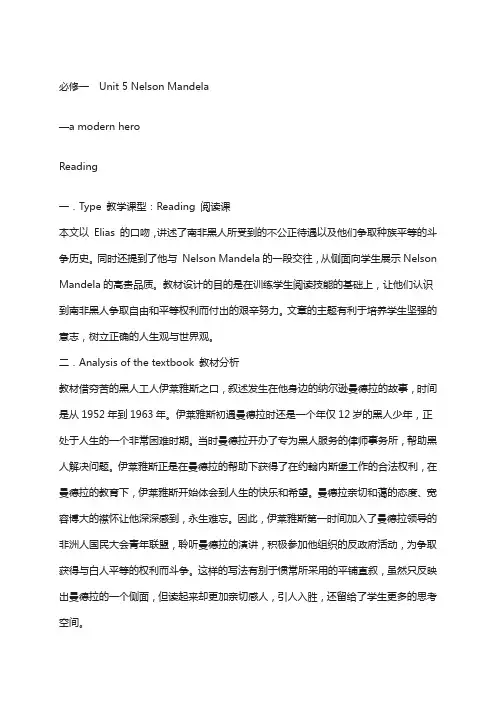
必修一Unit 5 Nelson Mandela—a modern heroReading一.Type 教学课型:Reading 阅读课本文以Elias 的口吻,讲述了南非黑人所受到的不公正待遇以及他们争取种族平等的斗争历史。
同时还提到了他与Nelson Mandela的一段交往,从侧面向学生展示Nelson Mandela的高贵品质。
教材设计的目的是在训练学生阅读技能的基础上,让他们认识到南非黑人争取自由和平等权利而付出的艰辛努力。
文章的主题有利于培养学生坚强的意志,树立正确的人生观与世界观。
二.Analysis of the textbook 教材分析教材借穷苦的黑人工人伊莱雅斯之口,叙述发生在他身边的纳尔逊曼德拉的故事,时间是从1952年到1963年。
伊莱雅斯初遇曼德拉时还是一个年仅12岁的黑人少年,正处于人生的一个非常困难时期。
当时曼德拉开办了专为黑人服务的侓师事务所,帮助黑人解决问题。
伊莱雅斯正是在曼德拉的帮助下获得了在约翰内斯堡工作的合法权利,在曼德拉的教育下,伊莱雅斯开始体会到人生的快乐和希望。
曼德拉亲切和蔼的态度、宽容博大的襟怀让他深深感到,永生难忘。
因此,伊莱雅斯第一时间加入了曼德拉领导的非洲人国民大会青年联盟,聆听曼德拉的演讲,积极参加他组织的反政府活动,为争取获得与白人平等的权利而斗争。
这样的写法有别于惯常所采用的平铺直叙,虽然只反映出曼德拉的一个侧面,但读起来却更加亲切感人,引人入胜,还留给了学生更多的思考空间。
在本单元的Warming up &pre-reading部分,学生通过图片了解了一个伟人应具备怎样的品质。
为熟悉本课的内容作了铺垫。
虽然学生对一些伟人已经有一点的背景知识,但是对Nelson Mandela 并非完全了解。
本节课的目的是让学生通过阅读,从语言材料中获取相关信息,并通过对信息的加工和处理,提高他们的语言运用能力。
1. Teaching Aims教学目标1)Knowledge objectivesa.Students will be able to learn the useful new words and expressions in this part: Hero,quality,republic,principle,nationalism,livelihood,fight,youth,peaceful,prison,leg al,equal,law,advise,continue,gold,passbook,ANC,league,stage,vote,position,accept,violenc e,devote,vote, guidance, blow up, in troubleb. Enable the students to read Elias’ storyc. Guide the students to know the qualities of Nelson Mandela as a great leader[中小学教育教学资料]2)Ability objectivesDevelop the students ’reading skills, such as fast reading ,careful reading and summarizing [中小学教育教学资料]a.Improve the students’ comprehension ability3)Emotion objectivesa,Understand the qualities great person have in common and learn the fine qualities from themb.Develop the students’ moral quality2.Teaching important points教学重点a.Enable the students to read Elias’ story and Learn to grasp the main idea of the text.b.Enable students to talk about the fine qualities of great people,especially Nelson MandelaImprove the students’ reading ability [中小学教育教学资料]3.Teaching difficult points 教学难点a.How to grasp the main idea of the text.b.How to help develop students’ reading abilityc.How to help students learn from Nelson Mandela4.Teaching methods 教学方法a.Student-centeredb.Task-based teaching method(任务型教学)c.Discussion5.Learning methods 学习方法Individual or pair work and group work [中小学教育教学资料]6.Teaching Aids 教具准备The multimedia三.教学设计1. 总体思路本堂课的主要内容分为四大部分,Pre-reading(阅读前活动) ,while –reading(阅读中活动),post-reading (阅读后活动)以及discussion(讨论) and role play 。
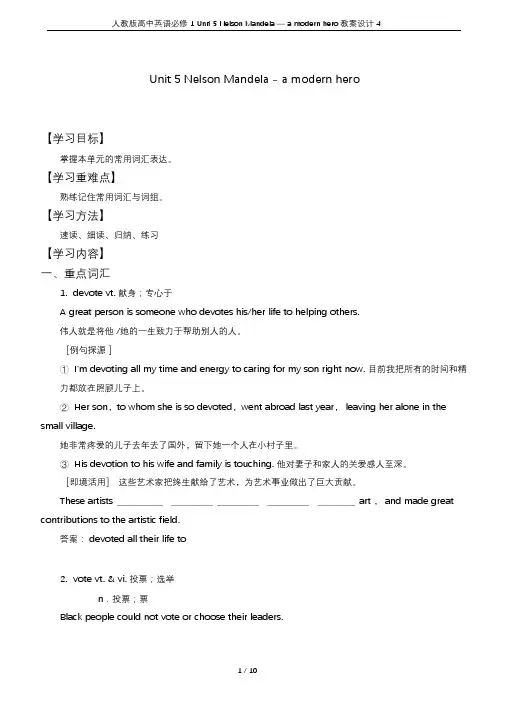
Unit 5 Nelson Mandela - a modern hero【学习目标】掌握本单元的常用词汇表达。
【学习重难点】熟练记住常用词汇与词组。
【学习方法】速读、细读、归纳、练习【学习内容】一、重点词汇1.devote vt. 献身;专心于A great person is someone who devotes his/her life to helping others.伟人就是将他/她的一生致力于帮助别人的人。
[例句探源]①I'm devoting all my time and energy to caring for my son right now. 目前我把所有的时间和精力都放在照顾儿子上。
②Her son,to whom she is so devoted,went abroad last year,leaving her alone in the small village.她非常疼爱的儿子去年去了国外,留下她一个人在小村子里。
③His devotion to his wife and family is touching. 他对妻子和家人的关爱感人至深。
[即境活用]这些艺术家把终生献给了艺术,为艺术事业做出了巨大贡献。
These artists ___________ __________ __________ __________ _________ art ,and made great contributions to the artistic field.答案:devoted all their life to2.vote vt. & vi. 投票;选举n.投票;票Black people could not vote or choose their leaders.当时黑人没有选举权,他们无权选择他们的领导人。
[例句探源]①Did you vote for or against her? 你投了她的赞成票还是反对票?②We will listen to the arguments on both sides and then vote on it. 我们将先听听双方的论点,然后再表决。
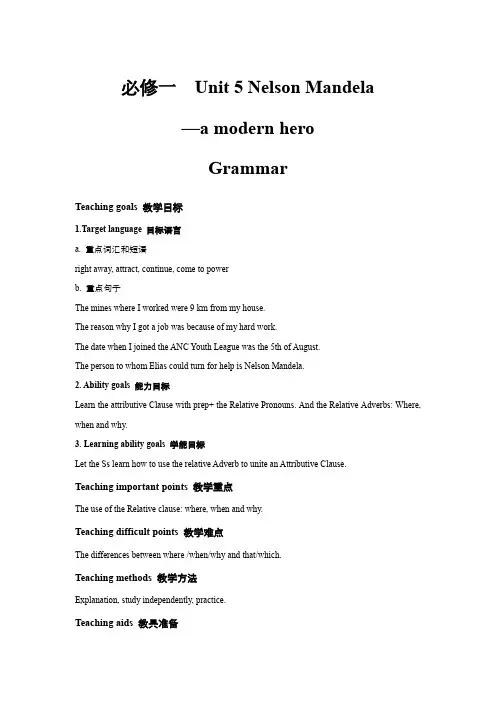
必修一Unit 5 Nelson Mandela—a modern heroGrammarTeaching goals 教学目标1.Target language 目标语言a. 重点词汇和短语right away, attract, continue, come to powerb. 重点句子The mines where I worked were 9 km from my house.The reason why I got a job was because of my hard work.The date when I joined the ANC Youth League was the 5th of August.The person to whom Elias could turn for help is Nelson Mandela.2. Ability goals 能力目标Learn the attributive Clause with prep+ the Relative Pronouns. And the Relative Adverbs: Where, when and why.3. Learning ability goals 学能目标Let the Ss learn how to use the relative Adverb to unite an Attributive Clause.Teaching important points 教学重点The use of the Relative clause: where, when and why.Teaching difficult points 教学难点The differences between where /when/why and that/which.Teaching methods 教学方法Explanation, study independently, practice.Teaching aids 教具准备A blackboard.Teaching procedures & ways 教学过程和方式Step I RevisionCheck the students’ homework.T: Who can tell us a great man?S: Mark Twain is a great man in my eyes. He is an American writer, journalist, humorist, who won a worldwide audience for his stories of youthful adventures of Tom Sawyer and Huckleberry Finn. In Green Hills of Africa, Ernest Hemingway wrote: "All modern American literature comes from one book by Mark Twain called Huckleberry Finn..." His main works are TOM SAWYER, THE PRINCE AND THE PAUPER, LIFE ON THE MISSISSIPPI and HUCKLEBERRY FINN.Sb: Marie Curie is my heroine. She is a famous chemist and physicist and the first person to won two Nobel Prizes for her work on radioactivity and her discovery of polonium and radium. I like her because her discovery of radioactive elements laid the foundation for future discoveries in nuclear physics and chemistry. Her best qualities are persistence, determination and modesty. Step II Discovering useful words and expressions (P36)Ask the students to finish the following form.T: So much for the Speaking, now please open your books and turn to Page 36. Let’s learn "Learning about Language". First let’s do Part 1 of Discovery Useful words and expressions.T: Now, please read the passage on Page 34 again and find the words that mean the same as the following expressions.Three minutes later.T: I will ask one student to tell us his or her answers. V olunteer!Sc: My answers are:1 league2 guidance3 out of work4 devoted5 mean6 stage7 the school fees8 fact9 mankind 10 youth.T: Right. Thanks!T: I will give you two minutes to finish Part 2. OK, begin!Three minutes later, check the answers together.T: Now, please complete the passage in part 3.Five minutes later, check the answers together.T: Now, please turn to Page 70, let’s do exercises of "Using words and expressions". Please finish them as soon as possible.About twelve minutes later. The teacher checks the answers to the first and third parts together and then ask four students to write down the answers to the translation of the second part on the blackboard. Then check them.Step III Discovering Useful StructuresT: Let’s come to Discovering Useful Structures on Page 37.In this part, teacher should tell the Ss the usage of where, when, and why in attributive clause. In most cases, where, when and why can be changed into prep+ which/whom.T: Today we’ll learn t he Attributive Clause with when, where and when.关系副词where/when/why在定语从句中分别作地点状语、时间状语和原因状语。
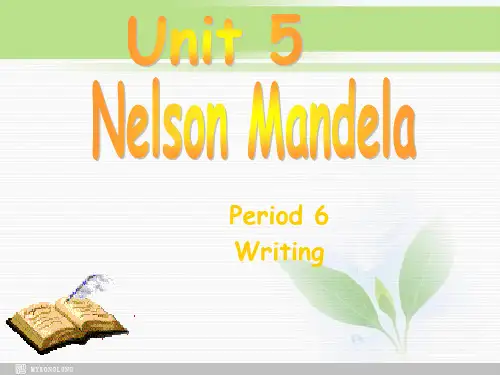
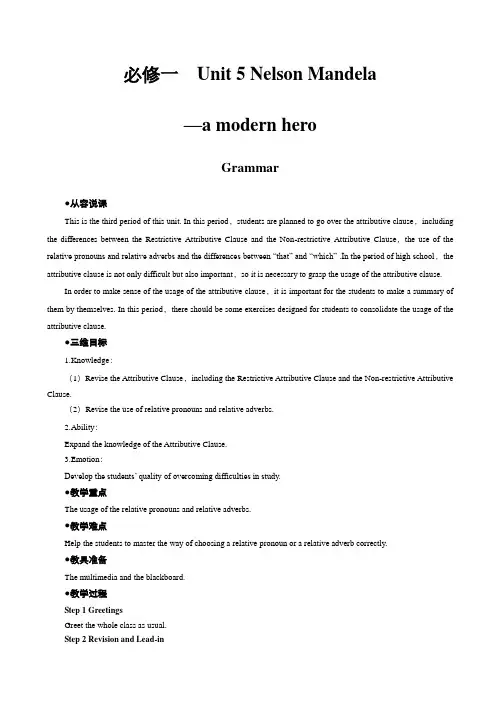
必修一Unit 5 Nelson Mandela—a modern heroGrammar●从容说课This is the third period of this unit. In this period,students are planned to go over the attributive clause,including the differences between the Restrictive Attributive Clause and the Non-restrictive Attributive Clause,the use of the relative pronouns and relative adverbs and the differences between “that” and “which” .In the period of high school,the attributive clause is not only difficult but also important,so it is necessary to grasp the usage of the attributive clause.In order to make sense of the usage of the attributive clause,it is important for the students to make a summary of them by themselves. In this period,there should be some exercises designed for students to consolidate the usage of the attributive clause.●三维目标1.Knowledge:(1)Revise the Attributive Clause,including the Restrictive Attributive Clause and the Non-restrictive Attributive Clause.(2)Revise the use of relative pronouns and relative adverbs.2.Ability:Expand the knowledge of the Attributive Clause.3.Emotion:Develop the students’ quality of overcoming difficulties in study.●教学重点The usage of the relative pronouns and relative adverbs.●教学难点Help the students to master the way of choosing a relative pronoun or a relative adverb correctly.●教具准备The multimedia and the blackboard.●教学过程Step 1 GreetingsGreet the whole class as usual.Step 2 Revision and Lead-in(Teacher checks the homework exercises first and then shows the following on the screen.)Ss:Yes. They all identify the nouns,which are used with them. Each part tells us which thing or person the speaker is talking about.T:That is to say,the function of each underlined part is the same. Each of them is used as an attribute to describe each noun. Well,are there any differences between them?S1:Yes. In the first sentence,the attribute is an adjective and put before the noun;the second is a prepositional phrase put after the noun;the third and fourth sentences are full sentences put after the nouns.T:You are right,what do we call the sentences put after the noun?Ss:The Attributive Clause.T:Quite right. In a complex sentence,the clause modifying a noun or a pronoun in the main clause is called an Attributive Clause. The noun or pronoun is called Antecedent. The word that/which introduces the clause (between the noun/pronoun and the clause)is called Relative Pronoun or Relative Adverb. The relative pronouns or adverbs do two jobs at once. They can be used as subjects,objects,attributes or adverbials;in the clause,at the same time,they join clauses together. About the use of them,we’ll have particular revision after a while. Now look at the sentences on the screen.(Teacher shows the following on the screen.)S2:I think “why” should be filled. Because the antecedent is “the reason” and the relative is used as the adverbial of reason in the Attributive Clause.T:Yes. How about the second sentence?(Teacher goes to another student and asks her/him to answer.)S3:I fill “whose” here. Because the antecedent is “the woman” and the relative is used as the attribute in the Attributive Clause.T:Right. Sit down,please. Now let’s look at the third sentence.Suggested answers:1. why2.whose3.whose4.that5.whereStep 3 Summarize the use of the Non-restrictive Attributive ClauseT:The Non-restrictive Attributive Clause is a clause,which gives extra information to the antecedent. So we use a comma to interrupt the sentence. When the Non-restrictive Attributive Clause is cut off,the sentence still has a full meaning. Now look at the sentences on the screen.(Show the following on the screen.)the Non-restrictive Attributive Clause. You should pay more attention to the structure “Indefinite Pronoun/Numbers/Noun/Superlative + of which/whom” is often used in the Non-restrictive Attributive Clause.Step 4 The usage of the Relative Pronouns and the Relative AdverbsT:As we know,relative pronouns or adverbs play important parts in the Attributive Clause. Now let’s make a list of them on the blackboard first and then revise their usage with the help of the forms on the screen.(Bb:the relative pronouns:who,whom,that,whose,which;the relative adverbs:when,where,why)(Teacher collects them first and then shows the following.)Form 1:T:1.When a relative pronoun is used as a subject in the clause,the verb must agree with the antecedent in person and number.plural form. However,if there is “the”or “only” before “one”,the verb in the clause must be singular,agrees with theword “one”.depends on the function of the relative word in the clause.T:As we know,both “that” and “which” can be used for things,but the use of them is not always the same. Let’s look at the sentences on the screen.(Show the following on the screen.)1 This is the second article that I have written in English.2. It is the best film that he has ever seen.3. This is the very book that I want to read.4. All that they told me surprised me.5. They talked about the teachers and schools that they had visited.6.Who is the comrade that was there?7. There is a bed in the room that is still vacant.8. Our village is no longer the place that it used to be.T:From the sentences on the screen,we can make a summary of the use of “that” and “which”. Look at the screen again.(Show the following on the screen.)T:No w let’s do some exercises. Look at the screen. Fill in the blanks,choosing proper relative pronouns or relativeadverbs.(Show the following on the screen.)1~5 ABCCC 6~10 DACBCStep 7 TestT:Now let’s have a test. Look at the screen. Do this exercise by yourself. A few minutes later I’ll give you the answers.(Show the following on the screen.)1~5 BDDCDStep 8 Homework1 .Review the Attributive Clause.2. Do WB P71.Ex 1.2.●板书设计This activity is designed to make a deep research into the attributive clause. The students are asked to design some exercises about the attributive clause. And then they can exchange exercises each other and check themselves. The purpose of this activity is to help the students make sense of the usage of the attributive clause.●备课资料Ⅰ. Some exercises about the Attributive Clause1.A football fan(球迷)is ____________ has a strong interest in football.A. a thing thatB. something thatC .a person who D. what2.The house,____________ was destroyed in the terrible fire,has been repaired.A. the roof of whichB. which roofC. its roofD. the roof3.Can you lend me the novel ____________ the other day?A. that you talkedB. you talked about itC. which you talked withD. you talked about4.The matter ____________ you were arguing about last night has been settled.A. thatB. whatC. whyD. for which5.Who ____________ has common sense(常识)will do such a thing?A. whichB. whoC. whomD. that6.All the apples ____________ fell down were eaten by the pigs.A. thatB. thoseC. whichD. what7.They asked him to tell them everything ____________ he saw at the front.A. whatB. thatC. whichD. where8.I’ll tell you ____________ he told me last night.A. all whichB. all whatC. that allD. all9.A child ____________ parents are dead is called an orphan.A. whoB. who’sC. whoseD. which10.Is this the museum ____________ you visited the other day?A .that B. where C.in which D. the one11.Is this museum ____________ some German friends visited last Wednesday?A. thatB. whereC.in whichD. the one12.—How do you like the book?—It’s quite different from ____________ I read last month.A. thatB. whichC. the oneD. the one what13.The train ____________ she was traveling was late.A. whichB. whereC. on whichD.in that14.He has lost the key to the drawer ____________ the papers are kept.A. whereB. on whichC. under whichD. which15.It’s the third time ____________ late this month.A. that you arrivedB. when you arrivedC. that you’ve arrivedD. when you’ve arrived16.He often helps the students ____________ he thinks are not quick at their studies.A. whomB. whoC. whenD. because17.The Second World War ____________ millions of people were killed ended in 1945.A. whenB. during thatC.in whichD. which18.Mr Crossett will never forget the day ____________ he spent with his various students.A. whenB. whichC. during whichD. on which19.This is just the place ____________ I am longing to visit these years.A. that B whereC.in whichD.to where20.We are going to spend the Spring Festival in Guangzhou,____________ live my grandparents and some relatives.A. whichB. thatC. whoD. whereSuggested answers:1~5 CADAD 6~10 ABDCA 11~15 DCCAC 16~20 BCBADⅡ. The attributive clause 定语从句1.“介词+关系代词“是一个普遍使用的结构(1)“介词+关系代词”可以引导限制性定语从句,也可以引导非限制性定语从句。
Unit 5 Nelson Mandela – a modern hero 一、单元教学目标和要求(Teaching aims and demands) 二、教材内容分析(Analysis of the teaching materials) 三、教学安排(Teaching arrangements) 四、单元预习任务(Pre-unit Activities: Preview Task) 五、教学步骤 (Teaching procedures) 六、背景参考资料(Background knowledge) 七、评价与反思(Assessment and reflection)
一、教学目标和要求(Teaching aims and demands)
根据课程标准实验教材(英语 必修)关于总目标的具体描述,结合高一学生实际和教材内容,我们将教学目标分为语言知识、语言技能、学习策略、情感态度和价值观四个方面。 1. 语言知识 (Knowledge) 词汇(Vocabulary):
用心 爱心 专心 1能理解、内化、运用以下生词---- hero, quality, willing, active, republic, fight, peaceful, prison, prisoner, period, law, advise, continue, fee, gold,youth,league,stage,vote,position,accept,violence,equal,blanket,degree,guard,educated,terror,fear,cruelty,reward,right(n.),criminal,leader,president,sentence(v.),sincerely
短语(Phrases and expressions):lose heart, in trouble ,worry about, out of work, Youth League, as a matter of fact, blow up, put ... in prison, come to power , set up , be sentenced to
功能(Functions):学习掌握一些用于发表意见与评论的结构句式,如: 1. 发表意见 (Giving opinions) Why do you think so? What do you think of ...? What's you opinion? agree / don't agree.I think / don't think .... I prefer .... In my opinion .... I'm afraid .... 2. 评论 (Making comments) Good idea! That's an excellent idea. 语法(Grammar):定语从句(II)(由where, when, why, 介词+ which, 介词+ whom引导的定语从句)
The school where I studied only two years was three kilometres away. This was a time when you had got to have a passbook to live in Johannesburg The reason why I got a job was because of my hard work. …we were put in a position in which we had either to accept we were less important, or fight the Government. The person to whom you should be grateful for a peaceful South Africa is Nelson Mandela.
扩展词汇: negative(消极的), heroine(女主角,女主人公), unwilling(不情愿的), nation(国家,民族), sacrifice(牺牲),realize(认识到), give up(放弃), riches(财富), Bible(圣经), revolution(革命), career(职业), equality(平等), fairness(公平), conflict(冲突), biography(自传), beliefs(信仰), Christianity(基督教), religion(宗教), priests(牧师), version(翻译), readable(易读的), adventure(冒险), scholar(学者), sympathy(同情), ,campaign(从事活动), communist(共产主义者), injustice(不公平), oppose(反对), pilot(飞行员), boycott(联合抵制)。 2. 语言技能 (Skills) 听:在本单元的课文及练习册听力教学中, 能听懂人物和事件以及它们的关系,能抓住所听语段中的关键词,正确理解话语间的逻辑关系。
说:在本单元的课文及练习讨论时, 能恰当使用I think/ I don’t think/ in my opinion/That’s an excellent idea等对英雄、伟人的品质恰当地发表意见,进行讨
用心 爱心 专心 2论。 读:能在阅读中使用不同的阅读策略,迅速地从阅读材料中获取主要信息,根据上下文线索预测故事发展,根据上下文猜测词义并通过不同渠道如报刊、音像、网络等了解更多伟人的情况。 写:能用恰当的语言简单地描述人物,并简单地表达自己的意见。 3. 学习策略(Strategy): 1. 在听和读的训练中,学会借助情景和上下文猜测词义或推测段落大意,借助图表等非语言信息进行理解和表达。 2. 主动制定本单元学习计划,客观评价自己的学习效果,在课内外活动中积极用英语交流,有效地使用词典、图书馆、网络等媒体资源来获得更多的有关伟人的英语信息。 4. 情感态度和价值观(Affect and Values) 了解Nelson Mandela的生平事迹,认识伟人所应具备的优秀品质,并向他们学习,以提高自身素质,树立正确的人生观,学习他们在艰苦的环境下为人类做贡献、不追求享乐的高尚精神。同时也学会一分为二的态度客观看待事物。
二、教材内容分析(Analysis of the teaching materials) 本单元的中心话题是当代英雄纳尔逊·曼德拉。故事的主题内容分成三个部分,由穷苦的黑人工人伊莱亚斯叙述他眼中的曼德拉。这样的写法虽然只能反映出曼德拉的一个侧面,但读起来却更为客观可信,使学生对曼德拉有初步的了解。第一篇阅读短文伊莱亚斯向我们介绍1952-1963年期间的曼德拉。第二篇听力短文伊莱亚斯讲述了他为了争取与白人有平等的权利而参加了曼德拉的非洲国民大会青年联盟。第三篇阅读短文伊莱亚斯说到他在罗本岛监狱得到了曼德拉的帮助,非国大(ANC)掌权后,伊莱亚斯又回到罗本岛监狱担任导游。这有别于惯常采用的直叙手法,尽可能剔除作者的主观看法,留给学生更多的思考空间,启发学生自己去思考,主动地表述对自己心目中英雄人物的看法。为了让学生完成写作任务,教科书又提供了曼德拉的生平履历表,让学生对曼德拉有了一个更完整的认识。“热身”(Warming Up)部分要求小组讨论伟人应具有的品质,并通过一组问题让学生了解彼此的特点与看法。“读前”(Pre-reading)部分提供了一些重要的历史人物,要求学生读懂每个人的基本情况,并判断他们中谁能称得上是伟大的人。“语言学习”(Learning about Language)部分突出了词汇和语法的学习与训练。本单元的语法是when, where, why, 介词+ which,介词+ whom引导的定语从句。“语言运用”(Using Language)部分中包括了听、读、写三个部分的内容,是本单元主要阅读篇章故事的延续。学生可从中了解南非黑人当时的生活状况以及他们不平等的社会地位,发现曼德拉的伟大之处。该部分提出的一些问题有利于培养学生独立思考的能力和人文精神。其中“写作”(Writing)部分是训练学生选取和组织材料,写出具有说服力的书信。练习册的写作要求学生学写有关伟人或名人的生平。“学习建议”(Learning Tip)指导学生收集、选择和分析有关名人的材料,了解人们对这些名人的评论,以学会正确地评价人物。
三、教学安排(Teaching arrangements) 用心 爱心 专心 3Period 1: Reading I (Elias’ story +the rest of Elias’ story) Period 2: Reading II (review +listening (sb)+language points) Period 3: More language input (reading task (wb) + listening (wb)) Period 4: Language Practicing (grammar) Period 5: Writing
本教学安排根据“LARA教学原则”,对教材进行大胆的删除(L – leave out)、 修补(A – Amending)、替换(R – Replace)、增添(A – Add),灵活的将教材为我所用。新教材在选材和教学活动的设计上充分考虑到学生年龄特征和他们生理和心理发展的需要;在采用话题、功能、结构相结合的教学方法的基础上,设计了“任务型”的活动;对英语语言知识和技能训练作了系统的安排,循序渐进,循环反复,有利于学生构建知识系统;注意培养创新精神,提高实践能力。但新教材也应与学生的实际相结合,我们不能全盘照搬。同时在教学过程中,为了对教学有及时的反馈和有效的改进,我们还进行了“形成性评价”,体现了学生的主体地位。 本单元的语言技能和语言知识几乎都围绕“当代英雄”这一中心话题设计的。我们根据本单元实际情况对教材的课时安排作了一些调整,尤其是学生用书(Student’s Book)和作业本(Workbook)有机结合。 根据本单元的教材的特点,按照任务型教学与大容量输入与输出的教学理念,整个单元的设计思路如下:输入“英雄”的概念,先是学生的自由讨论,更通过曼德拉的事迹向学生展示何为当代伟人,以及伟人所要具备的一些品质。在这基础上,第二步要学生辨别伟人与名人的不同,以及体会一分为二的辩证唯物主义。最后我们回到生活中,生活中也有不少平凡但是为了集体崇高的理想,放弃个人利益而不断努力克服困难的普通民众,他们也是我们心目中的英雄,伟人。由此我们从书本回归到生活,也成功升华,延伸了英雄的概念。通过学习语言点、语法还有写作,学生在内化吸收了知识后,进行了输出。 第一课时是人物传记式的阅读课,但是文章的写作角度比较特别,由穷苦的黑人工人伊莱亚斯叙述他眼中的曼德拉,这样的写法比较客观可信。伊莱亚斯的故事与遭遇同时也成为本文与本课的一条贯穿总线。课文有关中心话题的有三个部分,第一篇阅读短文伊莱亚斯向我们介绍1952-1963年期间的曼德拉。第二篇听力短文伊莱亚斯讲述了他为了争取与白人有平等的权利而参加了曼德拉的非洲国民大会青年联盟。第三篇阅读短文伊莱亚斯说到他在罗本岛监狱得到了曼德拉的帮助,非国大(ANC)掌权后,伊莱亚斯又回到罗本岛监狱担任导游。考虑到故事发展与情节展开的连续性与关联性以及课堂时间,在这个课时,把第一篇阅读短文与第三篇阅读短文整合起来完成,听力则放在第二课时。首先我们以一首英文经典歌曲 “hero”作为课前的英语氛围的营造与课内的导入,以老师问学生答的有效互动形式自由谈论他们所喜爱的hero并说明理由,提高了“说”的能力。然后是Workbook “talking”部分的四幅人物图像的呈现,以图片展示的形式激励学生用英语进行语言实践活动,然后归纳出英雄的一个模糊标准,为课文学习做好铺垫。之后正式人物曼德拉的登场,进入主题伊莱亚斯眼中的曼德拉。快速阅读部分训练学生的快速阅读能力并让学生对文章的梗概有所了解,对中心人物与背景有一定的印象。在细读过程中,根据课文的内容,问题设计以伊莱亚斯的人生发展为贯穿总线,同时以曼德拉给予他的影响为副线,环环相扣,层层递进,检查学生对文章的理解程度。在学生掌握课文内容并有了一定量的信息输入之后,给学生创造情境,让学生将所学的知识真实地运用到情境交际中,达到巩固知识与信息输出的目的。在此,依据学生的认知水平,我们设计两个不同难度系数的任务。任务1:Suppose you were Nelson Mandela or Nelson Mandela’s wife, would you like to tell us something impressive? 这里我们希望学生从伊莱亚斯外的角度来述说事情的发展过程,与文章的写作手法呼应,并巩固所学知识。任务2:四人小组活动,一个导游与三个游客之间的交流活动。相对任务1,